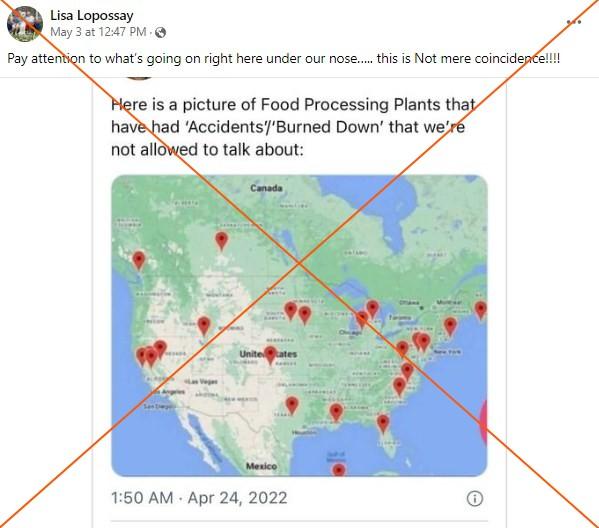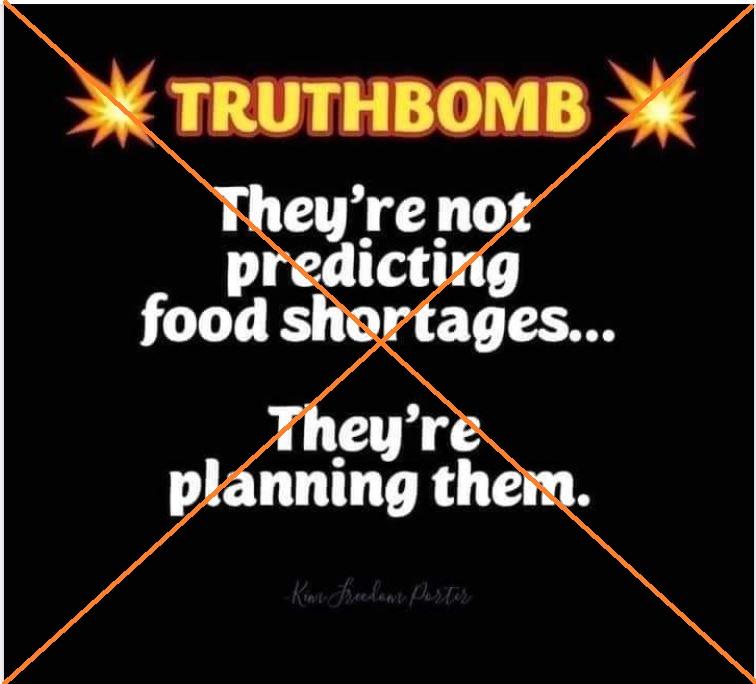
No evidence US food plant fires aimed at disrupting supply
"This is Not mere coincidence!!!!" a Facebook user posted on May 3, 2022, commenting on a map marked with points said to show US food plants "that have had 'Accidents'/'Burned Down' that we're not allowed to talk about."
Other posts shared similar messages such as: "They are not 'predicting' food shortages; they are PLANNING them." Twitter users also suggested a conspiracy, with two recent plane crashes at or near food facilities adding to the claims. The posts make no attempt to substantiate the motives or effect of the unnamed fire starters.


Experts on supply chain and fire prevention say there is no evidence of an unusual number of incidents, noting that 20 reported fires and other accidents would not have a major impact on a sector with more than 36,000 food processing facilities.
The National Fire Protection Association (NFPA), a non-profit safety group, said in a May 2 blog post that the recent number of food plant fires was not out of the ordinary.
"It's not unexpected to see fires in these kinds of structures," said Birgitte Messerschmidt, director of the NFPA research division, in a video interview on the blog.
"Fires are not a rare occurrence. We had 490,000 structure fires in 2020 in the United States. We see a lot of fires every year."
The NFPA analyzed data from the National Fire Incident Reporting System and found that in 2019, the number of fires at all manufacturing or processing plants in the country topped 5,300 -- about 15 per day. Of those, more than 2,000 fires were in agricultural, grain and livestock, and refrigerated storage facilities.
"Food is fuel," Messerschmidt said. "So as soon as you're operating with food, you have something that is combustible."
The incidents come, however, at a time when the United States has been experiencing strains on its food supply, exacerbated by the war in Ukraine and a shortage of farm labor.
Phillip Coles, a professor at Lehigh University who is affiliated with the school's Center for Supply Chain Research, said the fires do not appear to show any pattern but may be more noticeable at a time of stress and high prices in the food system.
"People are focused on this because we've had food shortages and people are more aware of things," Coles told AFP. "There are no more fires than normal, and most of them are small."
In late March, President Joe Biden warned of potential food shortages in the US and globally as a consequence of the Ukraine war. Some products, including baby formula, have been hit by other issues.
For the food supply, especially in the farm sector, Coles said: "Labor shortages are the biggest problem."
Russia's invasion of Ukraine has affected the global supply of grain, with supplies stuck in the latter's Mariupol and Odessa, both of which have been under attack.
The war has also limited Russian exports of fertilizer, according to Coles, a product that many food producing countries require.
There have also been knock-on affects; for example, some US corn production has been diverted for ethanol, to ease fuel shortages.
Because grains and other food products are traded on global markets, Coles said shortages in some countries can push up prices everywhere:"It's a global market and they all affect each other."
Food industry executives say they have seen no deliberate effort to disrupt supplies.
Tom Super, senior vice president of communications at the National Chicken Council, said he has seen no signs of foul play.
"I can only speak for chicken, but like any manufacturing plant/industry, there are generally a few fires that occur each year across the country," Super said in an email.
"The majority of them are accidental and are contained rather quickly. And certainly not enough to affect the chicken supply. There are about 200 federally inspected chicken slaughtering plants in the US, and thousands more that further process chicken."
Sam Gazdziak, communications manager for the American Association of Meat Processors, said his organization does not track fires but maintained that these are not uncommon.
But he added: "The US food supply is a vast network of processors, distributors and retailers, with facilities and warehouses around the country. It won't be disrupted because a few plants were damaged or destroyed by isolated, unrelated fires."
Copyright © AFP 2017-2026. Any commercial use of this content requires a subscription. Click here to find out more.
Is there content that you would like AFP to fact-check? Get in touch.
Contact us
